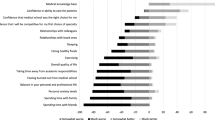Abstract
Purpose
This investigation explored the relationship between conscientiousness, as measured by completion of routine tasks, and performance (promotion decisions and the United States Medical Licensing Examination [USMLE] Step 1 performance).
Method
A retrospective, cohort-based design with consenting medical students (n = 251) was used to examine if a noncompliance index (NCI), comprised of completed course evaluations and weekly assessments, predicted overall and competency-specific promotion decisions and USMLE Step 1 performance. Associations among NCI and USMLE Step 1 scores, adjusting for both gender and Medical College Admission Test (MCAT) score, were explored with multivariable linear regression models. The Wilcoxon rank-sum tests investigated associations among NCI and subsequent promotion decisions.
Results
Unconscientious student behavior during year 1 predicted unfavorable performance in year 2 for overall promotion and adverse competency-specific decisions in professionalism, medical knowledge, and communication skills. Combined year 1 and year 2 NCI scores predicted students placed in remediation in year 2 and years 3 and 5. Each unit increase in year 1 NCI score resulted, on average, with a 1.6-point decrease (95% CI − 2.7 to − 0.5, p = 0.005) in USMLE Step 1 score and, in years 1 and 2, a 1.3-point decrease (NCI Yr1 and 2, 95% CI − 2.0 to − 0.6, p = 0.0005) in USMLE Step 1 score, after adjusting for gender and MCAT. No gender differences were detected in year 1 (p = 0.98) or years 1–2 (p = 0.86) with NCI scores.
Discussion
NCI metrics may provide schools with a feasible, systematic approach to identify and counsel at-risk medical students who do not complete routine administrative tasks.
Similar content being viewed by others
References
Dudley NM, K a O, Lebiecki JE, Cortina JM. A meta-analytic investigation of conscientiousness in the prediction of job performance: examining the intercorrelations and the incremental validity of narrow traits. J Appl Psychol. 2006;91:40–57.
Finn G, Sawdon M, Clipsham L, McLachlan J. Peer estimation of lack of professionalism correlates with low Conscientiousness Index scores. Med Educ. 2009;43:960–7.
McLachlan JC, Finn G, Macnaughton J. The conscientiousness index: a novel tool to explore students’ professionalism. Acad Med. 2009;84:559–65.
Papadakis MA, Teherani A, Banach MA, Knettler TR, Rattner SL, Stern DT, et al. Disciplinary action by medical boards and prior behavior in medical school. N Engl J Med. 2005;353:2673–82.
Rudland JR, Pippard MJ, Rennie SC. Comparison of opinions and profiles of late or non-responding medical students with initial responders to a course evaluation questionnaire. Med Teach. 2005;27:644–6.
Stern DT, Frohna AZ, Gruppen LD. The prediction of professional behaviour. Med Educ. 2005;39:75–82.
Ainsworth MA, Szauter KM. Medical student professionalism: are we measuring the right behaviors? A comparison of professional lapses by students and physicians. Acad Med. 2006;81:S83–6.
Kelly M, O’Flynn S, McLachlan J, Sawdon M. The clinical conscientiousness index. Acad Med. 2012;87:1218–24.
Ziring D, Danoff D, Grosseman S, Langer D, Esposito A, Jan MK, et al. How do medical schools identify and remediate professionalism lapses in medical students? A study of U.S. and Canadian medical schools. Acad Med. 2015;90:1.
Papadakis MA, Hodgson CS, Teherani A, Kohatsu ND. Unprofessional behavior in medical school is associated with subsequent disciplinary action by a state medical board. Acad Med. 2004;79:244–9.
Finn G, Garner J, Sawdon M. “You’re judged all the time!” Students’ views on professionalism: a multicentre study. Med Educ. 2010;44:814–25.
McLachlan J. Measuring conscientiousness and professionalism in undergraduate medical students. Clin Teach. 2019;7:37–40.
Reed D, West CP, Mueller PS, Ficalora RD, Engstler GJ, Beckman TJ. Behaviors of highly professional resident physicians. JAMA. 2008;300:1326–33.
Wright N, Tanner MS. Medical students’ compliance with simple administrative tasks and success in final examinations: retrospective cohort study. BMJ. 2002;324:1554–5.
Yepes-Rios M, Dudek N, Dudoyce R, Curtis J, Allard RJ, Varpio L. The failure to fail underperforming trainees in health professions education: a BEME systematic review: BEME guide no. 42. Med Teach. 2016;38(11):1092–9. https://doi.org/10.1080/0142159X.2016.1215414.
Kalet A, Chou CL, Ellaway RH. To fail is human: remediation in medical education. Perspect Med Educ. 2017;6:418–24. https://doi.org/10.1007/s40037-017-0385-6.
Bierer SB, Dannefer EF, Taylor C, Hall P, Hull AL. Methods to assess students’ acquisition, application and integration of basic science knowledge in an innovative competency-based curriculum. Med Teach. 2008;30(7):e171.
Bierer SB, Dannefer EF, Tetzlaff JE. Time to loosen the apron strings: cohort-based evaluation of a learner-driven remediation model at one medical school. J Gen Intern Med. 2015;30:1339–43. https://doi.org/10.1007/s11606-015-3343-1.
Author information
Authors and Affiliations
Corresponding author
Rights and permissions
About this article
Cite this article
Foshee, C.M., Nowacki, A.S., Shivak, J.T. et al. Making Much of the Mundane: A Retrospective Examination of Undergraduate Medical Students’ Completion of Routine Tasks and USMLE Step 1 Performance. Med.Sci.Educ. 28, 351–357 (2018). https://doi.org/10.1007/s40670-018-0552-3
Published:
Issue Date:
DOI: https://doi.org/10.1007/s40670-018-0552-3




